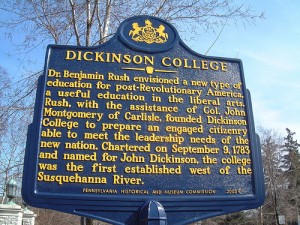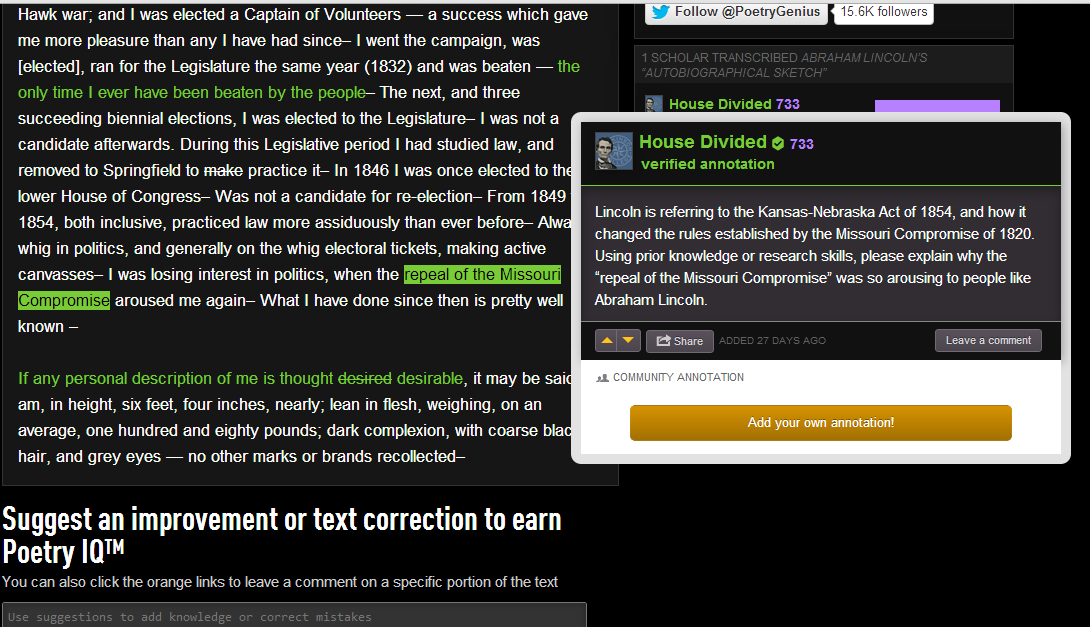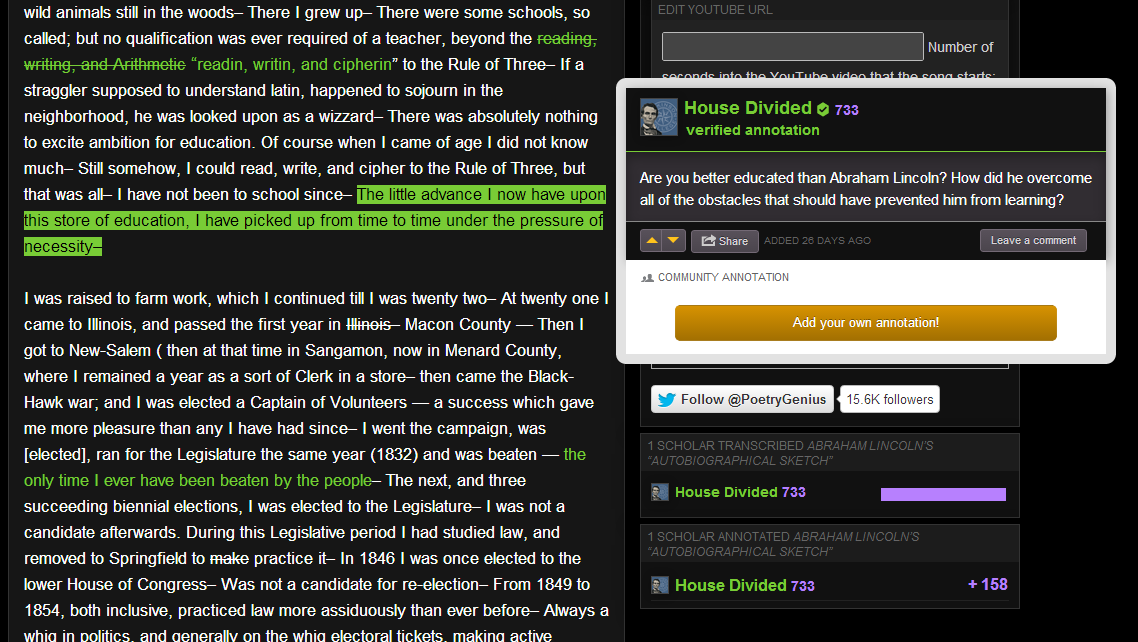KeystoneDH is an emerging group dedicated to supporting the digital humanities in Pennsylvania. The goal is to foster collaboration and digitally inflected scholarship and pedagogy within and between academic institutions. You can help build the foundation for KeystoneDH by filling out this survey.
Mellon Grant Interim Report 2013
Dickinson College received a $700,000 grant in December 2012 from The Andrew W. Mellon Foundation for use over approximately four years to support faculty and curricular development in the digital humanities. The Mellon Foundation provided project funding to support the following: 1) a one-course reassigned time for the faculty chair of a digital humanities advisory board to guide the initiative; 2) a postdoctoral teaching fellowship to help introduce the latest digital technologies, link Dickinson’s efforts to a larger community of scholars, and assist our Library and Information Systems (LIS) staff in defining needed future capabilities; 3) competitive internal grants for faculty to incubate significant expansion of existing digital projects and/or pilot the use of new tools in teaching and research, including providing student-faculty research opportunities; 4) an intensive program to better train undergraduate students for robust collaboration with faculty on complex digital projects; 5) a virtual “digital studio” to provide accessibility, visibility, and outreach for the best work being done at Dickinson in this field, 6) workshops with representatives of all humanities departments and with key all-college committees to enhance their capacity to support and evaluate digital work in the humanities and across the curriculum; and 7) work toward defining learning outcomes expected for Dickinson students with regard to digital humanities skills.
Here are some excerpts of the report prepared for the Mellon Foundation on activities completed in the first year of the grant, prepared by Cheryl Kremer:
1. Digital Humanities Advisory Committee
Over the past year we successfully established a Digital Humanities Advisory Committee (DHAC), which is the key planning committee for this initiative. DHAC has been meeting regularly to guide and oversee all of the aspects of the project. The committee was convened in the spring of 2013, has developed guidelines for awarding grants from the Digital Humanities Fund, and has been actively awarding these grants since the spring of 2013.
The committee is comprised of five faculty members: Chris Francese, Professor of Classical Studies (who will be Chair from 2013-2015); B. Ashton Nichols, Professor of English Language and Literature and the Walter E. Beach ’56 Distinguished Chair in Sustainability Studies; Susan Rose, Director of Community Studies Center and the Charles A. Dana Professor of Sociology; Matthew Pinsker, Associate Professor of History and Pohanka Chair in American Civil War History; and Siobhan K. Phillips, Assistant Professor of English. Also serving on the committee are five administrators who have a strong interest in and connection to digital humanities work on campus: Patricia Pehlman, Director of Academic Technology; Jim Gerencser, College Archivist; Todd Bryant, LIS Language Program Administrator; Ryan Burke, Web Programmer; and Matt Kochis, Postdoctoral Fellow in Digital Humanities.
2. Postdoctoral Teaching Fellow
Our second goal for this grant was to create a new post-doctoral fellowship position in digital humanities at Dickinson. We conducted a successful search and hired Matthew Kochis to fill this position. He received his Ph.D. from the University of Tulsa in May 2013 and began his work at Dickinson in July 2013. Matt has strong skills in digitization, XML, database design, and project management—all of which proved to be crucial to fostering digital humanities projects. He trained students to work with faculty to create usable XML documents, to digitize documents with ABBYY Finereader, to organize image assets using appropriate and current metadata standards, to implement effective workflows using the Basecamp application, and generally to manage projects more efficiently.
Our post-doc taught a course entitled Writing for Digital Media (ENGL 212) in the spring semester of 2014. He also met individually with many faculty members and students to assist in the development of a wide variety of digital humanities projects. Additionally, he designed and ran our first Digital Humanities Boot Camp—a training program for students interested in digital humanities that was held in January 2014. The successful Digital Humanities Boot Camp occupied much of Matt’s time in November and December of 2013 and January 2014. (For additional details, see item 4 below.) We are pleased to report that Matt Kochis was offered and accepted a tenure-track position at another institution, starting in fall 2014. A search for his replacement recently concluded with the hiring of Elyse Graham.
3. Digital Humanities Fund
The third major aspect of this grant involves awarding internal grants to support Dickinson faculty members interested in beginning or advancing their digital humanities efforts. The two main categories of support thus far have been: 1) summer student-faculty collaborative research pairings in which teams of one faculty member and one student work full time on a project for eight weeks, and 2) student research assistantships that assist one faculty member for approximately eight hours per week for either 14 or 28 week periods. The following is a list of grants awarded to Dickinson faculty members through our Digital Humanities Fund over the past year, the vast majority of which have involved students in substantive ways:
Art and Art History
• Melinda Schlitt – reassigned time to assist Prof. Chris Francese by annotating visual images for the first multimedia edition of Vergil’s Aeneid (to begin summer 2014)
Anthropology/Archaeology
• Christofilis Maggidis – rental of 3-D archaeological 3-D digitizing equipment for use in documentation of finds and architectural remains at Mycenae, Greece
Classical Studies
• Chris Francese
– student assistant to help create a new digitization of Allen & Greenough’s Latin Grammar to provide unprecedented ease of access and navigability for this basic resource for classicists
– student assistant for a new digitization of T.D. Goodell’s School Grammar of Attic Greek in sharable XML forma, to do the same for this resource
– student summer research assistant to help with the creation of the first multimedia edition of Vergil’s Aeneid (to begin summer 2014) with audio recordings, extensive image assets, and notes. (The audience for this project is AP Latin students (approximately 7,000/year) and others in colleges and universities.
– consultant to help develop a database of Vergilian vocabulary to be used in the Aeneid edition, based on a new digitization and editing of Frieze’s Vergilian Dictionary
English
• Wendy Moffat – student assistant to help with a curated exhibit based on and database of 2,000 images of letters, photos, maps, and ephemera from 24 archives and personal collections around the country relating to her forthcoming book entitled A Disbelief in Obstacles: Three Prophetic Americans and the Great War
German
• Sarah McGaughey – student assistant to help create foreign language instructional materials to be used with Mixxer, the Dickinson-based social networking website for connecting students in foreign language courses with native speakers abroad who are studying English
History
• Emily Pawley – reassigned time and student assistants to help develop a new online museum of Dickinson’s history, currently called the Dickinsonia Project
• Karl Qualls – student assistant to help develop a website on Russian-American émigrés, centered around oral history materials and interviews with Prince Gagarin
• Matthew Pinsker
– student assistant and faculty consultant to help develop a multimedia edition of Abraham Lincoln’s writings: 25 Lincoln podcasts by Prof. Todd Wronski (Theatre and Dance), providing teachers and students with a unique set of audio transcripts for teachable Lincoln documents. Filmmaker Lance Warren from the Gilder Lehrman Institute helped film and produce 25 short videos of Pinsker conducting close readings of these same featured Lincoln documents. These videos are now a focal point of the new website entitled “Lincoln’s Writings: The Multi-Media Edition” which launched in on July 7, 2013 and was named one of the “Best of the Humanities Web” by NEH EDSITEMENT in November 2013. (See http://housedivided.dickinson.edu/sites/lincoln/)
– student assistant to help digitize approximately 4,000 page image files from period sources such as Harper’s Weekly, Frank Leslie’s Illustrated Newspaper, and selected nineteenth-century books. Nearly 400 of these scanned images have since been edited and published at House Divided’s online Research Engine, with plans to post several hundred more in the coming months. (See http://hd.housedivided.dickinson.edu)
– two student researchers to help with the successful “Understanding Lincoln” open online course in summer 2013, which had 750 total participants including 100 tuition-paying graduate students. (See http://www.gilderlehrman.org/programs-exhibitions/understanding-lincoln-graduate-course) Materials from these student assistants and selected course participants were then featured in a special exhibition hosted by the Google Cultural Institute to help commemorate the 150th anniversary of the Gettysburg Address (See http://www.google.com/culturalinstitute/exhibit/lincoln-s-gettysburg-addresses/wReow-98)
French and Italian
• Nicoletta Marini-Maio – student assistant to help develop an online, open-access peer-reviewed journal project entitled “Gender/Sexuality/Italy”
Middle East Studies/Political Science
• Ed Webb – student assistants to help modify the video game “Civilization” for use in teaching the Spain/Aztec empire and the colonization of Africa
Music
• Greg Wilder – summer student assistant to help validate the boundaries of the Isomer Project’s capacity for machine musical analysis, model representation, and algorithmic transformation, using advanced machine-learning techniques
Religion/Judaic Studies
• Andrea Lieber – student assistant to help digitize information about a Jewish cemetery in Harrisburg,
Russian
• Maria Rubin – travel to develop content for her “Russian Rooms” multimedia authentic Russian language materials for educational use
Sociology
• Susan Rose – student assistant for summer and academic year to help develop a comprehensive digital resource regarding the Carlisle Indian Industrial School, including the digitization and annotation of school records in the National Archives. Many thousands of files have been digitized, annotated, and made available, with many more to come. (See http://carlisleindian.dickinson.edu/)
The following are faculty professional development projects in the digital humanities that were also funded by the grant:
Classical Studies
• Chris Francese and Matt Kochis – to attend THATCamp in Harrisburg (Oct. 25-26, 2013)
History
• Karl Qualls – to attend THATCamp in Pittsburgh (October 5-6, 2013)
Spanish and Portuguese
• Abraham Quintanar
– to attend the 48th Annual Congress for Medieval Studies in Kalamazoo Michigan for a workshop session on specific .RDF standards for MESA, a collation of medievalists who are posting digital texts in a specific, searchable format (May 8-12, 2013)
– to attend a workshop at Brown University entitled “Taking TEI Further: Teaching with TEI” (August 21-23, 2013)
4. Digital Humanities Boot Camp Program
Our first “Digital Humanities Boot Camp” was held from January 6 – 17, 2014 to provide advanced training for students interested in working with faculty on digital humanities projects. A total of 17 students participated. They were Santiago Princ (Computer Science), Barrett Ziegler (Russian Studies), Chloe Miller (Archaeology/Anthropology), Frank Vitale (History), Laura Colleluori (Theatre Arts/Italian Studies), Zha Xueyin (History/Sociology), Colin Tripp (English/Creative Writing), Rachel Schilling (English/German), Allison Charles (English/Creative Writing), Max Rubinstein (Biochemistry and Molecular Biology), Rachel Kruchten (Psychology), Ashieda McKoy (Political Science/Creative Writing), Amy Hudock (undeclared), Benjamin West (Archaeology), Xiang Wei (undeclared), Caio Santos Rodrigues (Psychology), and Jaime Phillips (Environmental Science).
Matt Kochis, our Mellon Postdoctoral Fellow in Digital Humanities, mapped this project’s curriculum and coordinated the boot camp’s day-to-day operations. After five days of online tutorials, students gathered on campus to be guided in the creation of sample digital projects and briefed on digital humanities methods and principles. The training focused on GIS, Drupal, WordPress, Adobe Photoshop, Audacity, and iMovie. Topics of sample projects ranged from Three Mile Island to the history of African-American students at the college. One student created a multimedia Drupal site called “Invasion from the Front Lines,” which detailed his grandfather’s World War II experience. A digital poster session, held on January 27, 2014 allowed students to present their work and connect with faculty members. The program received a strong positive response from student participants, with 26 applications received, and we expect to see even greater demand next year. As a result of the boot camp experience, some student participants have already linked with faculty members for summer projects and other future work in digital humanities.
5. Virtual Digital Studio
The chair of the Digital Humanities Advisory Committee created a web presence for the digital humanities initiative at Dickinson, consistent with the virtual “digital studio” concept presented in our original proposal. This site may be viewed at http://www.dickinson.edu/homepage/305/digital_humanities
6. Workshops for Faculty
We also conducted several very well-received workshops on the topic of digital humanities for faculty committees and departments. First, on December 17, 2013, Todd Presner, Professor of Germanic Languages, Comparative Literature, and Jewish Studies at the University of California Los Angeles and Chair of their Digital Humanities Program, presented a workshop for Dickinson’s Faculty Personnel Committee (FPC) to help them develop guidelines for assessing the use of digital technology in research and pedagogy as part of the faculty evaluation process. Seven tenured faculty members of FPC attended (from the Departments of Spanish and Portuguese, History, American Studies, Music, and Biology), two other faculty members from the Information Technology Services Committee (from the Departments of History and Religion), in addition to the Provost and Associate Provost.
Second, Prof. Jeffrey McClurken from the University of Mary Washington presented a full-day workshop concerning the use of digital humanities in teaching and research to a group of 27 faculty members from humanities and humanistic social science disciplines and 11 other administrators on January 10, 2014. McClurken recently received the Outstanding Faculty Award from the State Council of Higher Education of Virginia for Teaching with Technology. Faculty who attended his workshop represented the Departments of American Studies, Classical Studies, English, French and Italian, German, History, Medieval and Early Modern Studies, Music, Philosophy, Political Science, Religion, Sociology, Spanish and Portuguese, Theatre and Dance, and Women’s and Gender Studies. Administrators represented Library and Information Services, Academic Affairs, and College Advancement.
7. Defining Learning Outcomes
The January 2014 workshop conducted by Jeffrey McClurken (described above) represented a first step toward defining learning outcomes for Dickinson students with regard to digital humanities skills. At the conclusion of that workshop, faculty participants were encouraged by the Provost to return to their departments to discuss the possibility of convening smaller workshops to work more intensively on specific learning outcomes relevant to their department. We have agreed to provide internal funds (as cost sharing) for three to four departmental workshops, and plans are underway for several to occur in summer 2014.
8. Plans and Goals for Upcoming Year
Major activities planned for next year include completing the search for a replacement of our postdoctoral fellow in digital humanities, with a July 1, 2014 start date. In summer 2014 we will also be conducting several study groups for humanities and humanistic social sciences departments that are interested in defining department-specific student learning outcomes related to digital humanities. In the fall of 2014 we will be offering a workshop for the members of the college’s Research and Development committee concerning the evaluation of digital humanities scholarship. We will conduct our second Digital Humanities Boot Camp in January 2015. The Digital Humanities Advisory Committee will continue to meet throughout the year to review and award additional grants to faculty for related digital humanities scholarly projects and professional development activities, as well as summer and academic-year student collaborators and assistants to help in the development of their projects.
We are profoundly grateful to the Mellon Foundation for support of this comprehensive initiative in the digital humanities at Dickinson. As this interim report indicates, this grant has initiated a great deal of creativity and successful collaboration in its first year. It has created many new opportunities for humanities and humanistic social science faculty and students to create useful digital resources. All of this activity has generated a genuine sense of excitement among faculty and students, and we expect to continue to work diligently to leverage the Mellon Foundation’s generous support to continue vigorous growth in new projects, initiative, and collaboration in the year ahead.
Mining Data Gold
STUDENTS WRANGLE BIG DATA DURING ANNUAL SYMPOSIUM
by MaryAlice Bitts-Jackson
There’s a superabundance of data out there and growing demand for those who can mine it effectively. On May 6, 16 students showed them how it’s done during the GIS (geographic information system) Exhibition and Poster Session, an annual event showcasing the ways students apply powerful technology to recent or ongoing research.
“It’s a reasonably complicated computer program to learn, but it’s definitely worth the learning curve,” said Jill Hautaniemi ’14 of the software, which provides a framework to store and analyze geographically based data.
MAPPING NEAR AND FAR
The students, all part of an advanced GIS-applications course, presented data that had been recently gathered in points near and far. A double major in environmental science and biology, Hautaniemi cross-referenced data she’d collected for her senior biology-research project with elevation data sets from a government Web site, and found correlations between elevation levels and the health of hemlock trees in the Carlisle region.
Jenna LaRiviere ’14, an archaeology major, married historical and construction data about barns in Pennsylvania with the geological makeup of the ground on which each barn stood. “By integrating location with foundational materials, we can get insights about the economic, political and practical reasons why they chose these materials, and this tells us something about the people who lived there,” says LaRiviere, who will pursue a master’s in museum studies at the University of East Anglia in the fall. “It adds a whole new dimension to our understanding of their histories.”
Environmental science major Jack Bryan ’14 examined stream-remediation options in nearby Michaux State Forest, using raw data collected by the Pennsylvania Department of Conservation and Natural Resources and by students in a conservation seminar. By creating elevation and relief profiles of the watersheds, he was able to identify the areas most in need of cleanup, and he’ll make the project available to stream-monitoring volunteers.
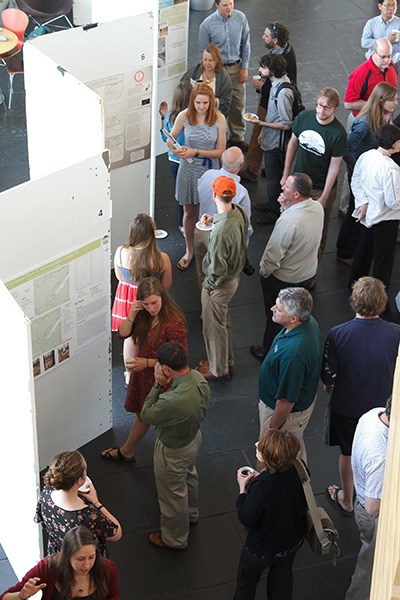 Photo by Carl Socolow ’77.
Photo by Carl Socolow ’77.“Hopefully, they’ll build on this, and as they do, they’ll be able to recognize patterns and use different variables in tandem, combining data they might not think to combine,” Bryan said.
Taylor Thompson ’14 presented student-faculty research on the effects of temperature on sex determination in painted turtles born in 2010 at a local pond. She inputted temperatures recorded at 16 turtle sites with the precise locations of each nest, the makeup of the soil on which they rested and the sex of the turtles born there. Nests built on natural soil, which stabilizes slight temperature fluctuations, yielded a roughly even number of male and female turtles, whereas nests built on a soil-gravel mix did not. “Because the information is displayed spatially, you can see the patterns emerging,” she said.
Other locally based projects included Michael D’Aprix ’14’s geodatabase for Dickinson’s campus, Anna McGinn ’14’s produce-access map of the Carlisle area, Anne Dyroff ’14’s qualitative map of Carlisle running routes, Mary DiGiorgio ’14’s analysis of campus trees and Christine Burns ’14’s study of trees in downtown Harrisburg.
Projects rooted farther from home included a crime-rate analysis of North Philadelphia (Amanda Vandenburg ’14), a basin analysis of a state park in Maine (Elizabeth de la Reguera ’14) and a trail map of Michaux State Forest (Tucker Deady ’14), while Will Kochtitzky ’16 and Leslie Milliman ’14 went global, creating a map of lake vegetation in Bolivia and of weathering on an island in Guadeloupe, respectively.
“It’s amazing how many different applications there are, as you can see in the variety of subjects represented here,” said Thompson, an environmental studies major who plans to apply GIS technology to her analysis of trail connectivity as part of her job with the Doylestown Heritage Conservancy, which begins after her graduation in May.
“And we’re just scratching the surface,” added Bryan. “It’s essential to know how to apply basic skills in new contexts. And this is an incredibly useful and powerful tool.”
Source: http://www.dickinson.edu/news/article/1080/mining_data_gold
Plotagon Videos on Transnational Feminism
Plotagon, launched in August 2013 by a Swedish start up and still in its beta version, cuts the effort needed to create animation by directly recreating a script into an animated film. The films can then be posted on Plotagon’s website, or on Youtube. Jennifer Musial, Visiting Assistant Professor of Women’s and Gender Studies, is putting the form to productive academic use by having her students make videos with solidly researched information. Students in the Transnational Feminisms class make videos based on their major research project. Using Plotagon, each student creates a script featuring one character, an expert in the field, who must communicate research findings to a less knowledgeable character. Students enjoy this creative way to convey their learning in the course. Leigh Ratino, a graduating senior in Environmental Science, created this one, a conversation about environmental racism.
For more Transnational Feminism Plotagon videos, check out the class blog.
Russian Rooms, Spring 2014
Russian Rooms is a multimedia project created and curated by Maria Rubin, Visiting International Scholar at Dickinson for the 2012-2014, showing portraits of average Russians in their home environment. You can read about each person and listen to an interview with them (in Russian) while viewing their portraits and the picture of the room they call their own. As discussed an earlier post, all the material created in this project becomes a part of the open teaching resources of the Dickinson Russian department, and is available to anyone else who wishes to use it.
In the spring of 2014 the students in Prof. Alyssa DeBlasio’s Russian translation class (RUSS 334) worked on translating these texts, and completed 15 additional entries. The work was carried out by four students: Chase Philpot, Abby Preston, Peter Sisson, and Maxim Demidov. Prof. DeBlasio reports that all the students did excellent work, and it was hard to pick one to highlight. When pressed, however, she suggested the following narrative, about a Tajik migrant worker in Moscow. The translation is by Abby Preston:
Roma is an illegal immigrant, a migrant worker. He came from Tajikistan to work in Moscow about ten years ago. Since then he has already changed jobs many times, and eventually he ended up in Moscow’s suburbs. In his homeland, Roma worked as a lawyer in a notary’s office and lived with his family in a historic stone house in the center of the city. Here in Russia he has worked as a guard, an administrator, a plant manager, and a construction worker.
Roma has lived in an old building in the greater Moscow area for almost four years, searching for a full-time job, getting acquainted with the locals, and earning money by working part time on the construction of country homes for some “new Russians”—Russians who became very wealthy after the fall of the Soviet Union. Roma would like to marry a Russian woman, but right now he is single. He maintains his room, cooks, and does laundry. He shares his room with a few other countrymen. During the day they work, and at night they sleep.
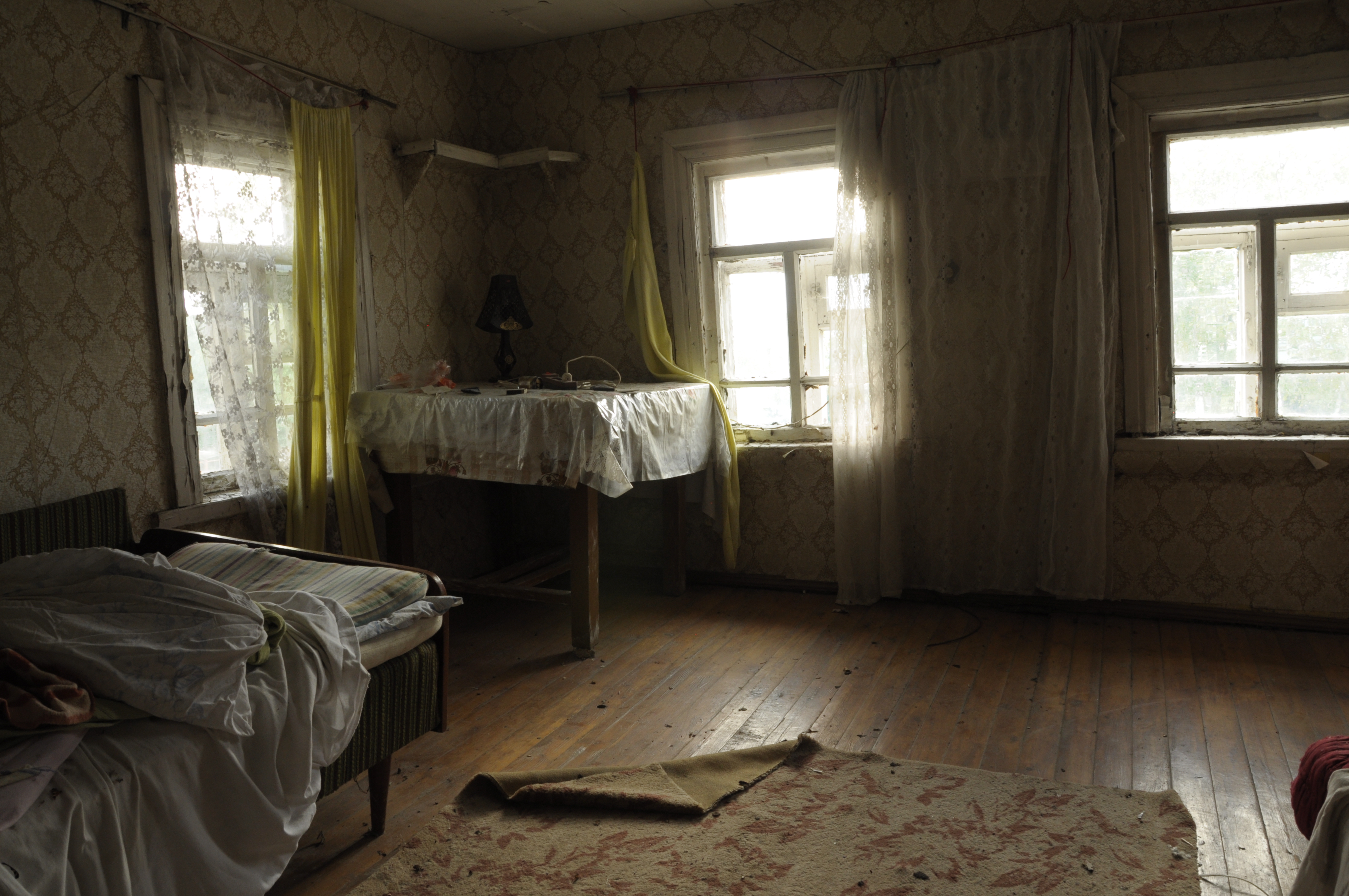
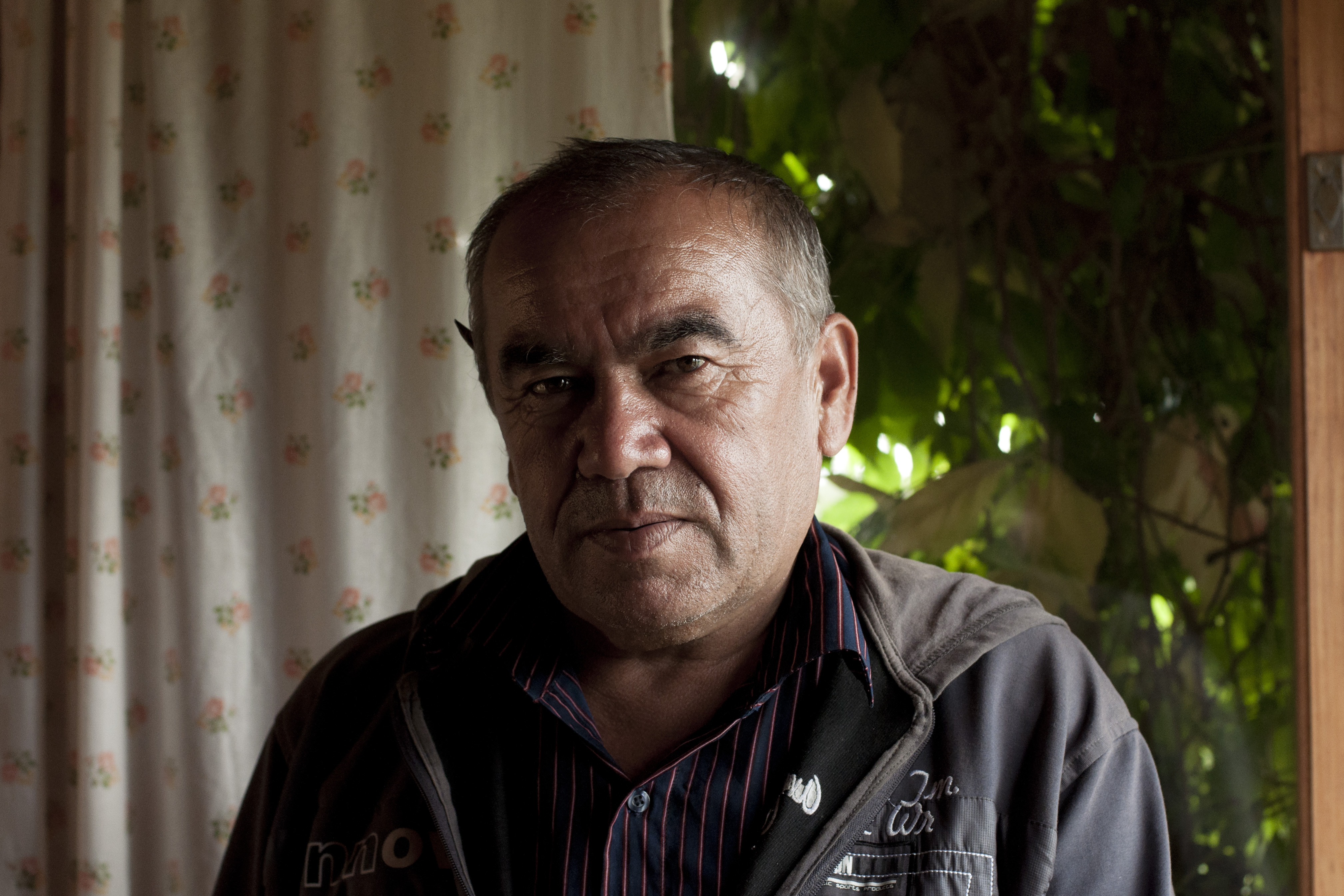
Photos by Maria Rubin. Source: http://blogs.dickinson.edu/russianrooms/2012/11/01/47/
For more, check out Russian Rooms!
Tech Talk Tuesday April 15 Free Pizza
The ITS (Information Technology and Services) committee invites students who are interested in digital literacy at Dickinson to a lunchtime discussion with the committee on Tuesday, April 15, 12-1:00, Rabinowitz Reading Room, (second floor, Waidner library). Join us for pizza and conversation about your experiences and interests in the college’s evolving digital environment. For more information contact Prof. Donaldson (donaldsm@dickinson.edu, ex 1228)
ABC27 News story on the Carlisle Indian School Project
Job: Mellon Postodoctoral Fellow in Digital Humanities at Dickinson College
With generous support from the Andrew W. Mellon Foundation, Dickinson College invites applications for a postdoctoral fellowship in Digital Humanities in the academic year 2014-15, with the potential for an additional year of support. The Fellow will work as a catalyst for faculty innovation by planning, promoting, and implementing strategies to encourage faculty discourse about pedagogy, e-learning tools, and the integration of digital media into teaching and scholarship. The postdoctoral fellowship is an academic appointment reporting to the Dean of the College through the faculty chair of the Digital Humanities Advisory Committee, but the Fellow will be housed alongside the Instructional Technology staff in the Library and Information Services division.
Job Summary/Basic Function:
The Fellow will a) teach one or two courses each year within his or her area of academic research; b) guide arts, humanities, and humanistic social science faculty in the use of digital tools for curricular and research purposes, and help them develop digital humanities projects; and c) work with LIS staff to train students in the January Digital Humanities Boot Camp to use digital tools and technologies in order to prepare them for significant student-faculty research collaborations. The Fellow will be eligible for the internal grants for pedagogical innovation, as well as standard faculty support for travel and professional development. The salary will be $50,000 plus benefits. Dickinson College is a private, highly selective, liberal arts college located within two hours of major research institutions and metropolitan areas.
Minimum Qualifications:
The Fellow must normally have received the PhD by July 1, 2014, and within the last four years, and not have held a tenure-track position. Candidates should be conducting research that requires demonstrated expertise in the use of Digital Humanities in their scholarly field.
Alec Ross to Speak at Dickinson on Digital Currency

Alec Ross drove the ground-breaking social media component of the 2008 Obama campaign, and now serves as senior advisor for innovation to US Secretary of State Hillary Clinton. Source: http://bit.ly/1lAEqvx
The Dickinson Student Senate Public Affairs Committee is pleased to announce that Alec Ross, the first Senior Advisor for Innovation to Secretary of State Hillary Clinton, is coming to speak at Dickinson College. Ross, who spearheaded President Obama’s technology and innovation plan and developed a digital payment platform for soldiers in the Congo, will explain Bitcoin’s origins, operations, and pitfalls, and describe the impact of the rise of digital currency on financial institutions, international politics, and global poverty. Ross will also and examine the implications of broader digital payment structures like Google Wallet, Square, and Simple on the world financial system, and argue that these changes are indicative of the demand for interdisciplinary approaches to banking and digital finance.
Ross will give his keynote address at 7PM in Allison Hall on Wednesday, March 26th, 2014. I hope you can join us!
Annotating with Poetry Genius and House Divided
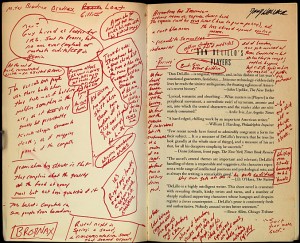
David Foster Wallace’s annotated copy of Don Delillo’s Players, from the Harry Ransom Research Center in Austin, TX. http://bit.ly/1ef5ziL
From scribbled marginalia to full-scale scholarly treatises that gobble the works on which they comment, text annotation is one of the most basic and diverse activities of the humanities. Its purposes embrace the intensely personal, the didactic, and the evangelical. It serves all kinds of communities, from the classroom to the law court, from the synagogue to the university research library.
The movement of text annotation to an online environment is still very much a work in progress. There are many platforms attempting to marry original text and a stream of added comments, some attractive and functional, some awkward. Crowd-sourced annotation is being tried in many corners, and sometimes it catches on (check out the remarkable wiki commentaries on the novels of Thomas Pynchon), sometimes they build it and nobody comes.
Rap Genius and its sister sites Poetry Genius and Education Genius are the most exciting recent entrants into this field. What distinguishes these sites is first the astonishing ease and flexibility of the interface. The mere selecting of a chunk of text allows one to add not just a typed comment but audio, video, links to parallel passages, embedded tweets, virtually anything digital. The other good thing about the Genius sites is the way they tap into existing communities of fans, readers, teachers, and students. Education Genius is well-funded by venture capital and has a staff that talks directly to teachers, works to make the site useful to students, and builds bridges with other sites and institutions.
A case in point is the emerging collaboration of Education Genius with Dickinson’s House Divided Project. An annotated version of Abraham Lincoln’s 1859 autobiographical sketch is now available at Poetry Genius, and represents the beginning of partnership between the House Divided Project and the Genius platform spearheaded by Dickinson College student Will Nelligan (’14). There is a general annotated guide to the sketch, which was originally written for a Pennsylvania newspaper when Lincoln was a presidential candidate, and also a version especially designed as an open Common Core platform. This is in keeping with the strong educational outreach of House Divided and its director, Associate Professor of History and Pohanka Chair in American Civil War History Matthew Pinsker.
There is an audio recording of the sketch in the voice of Lincoln as recreated by Todd Wronski, part of a larger multimedia edition of Lincoln’s writings being undertaken by House Divided. In the Genius platform clicking on different colored text brings up an annotation. Here is one with an embedded video player. Note that annotations are fully “social,” in that one can give them a thumbs up or down, share in various ways, and leave a comment on the comment.
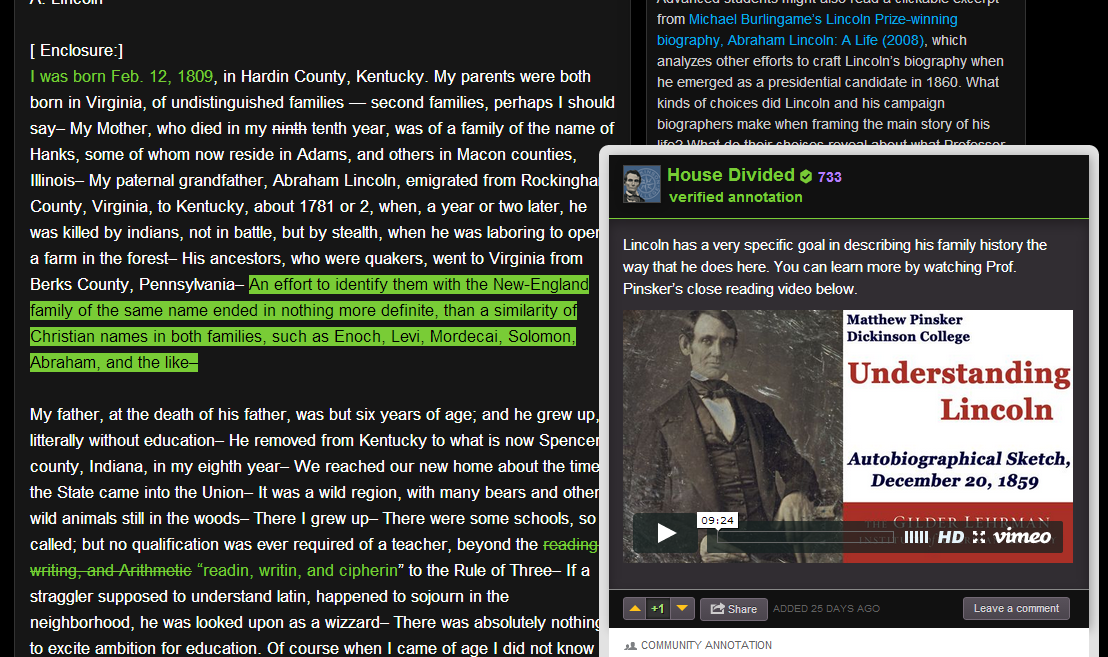
Clicking on different colored text brings up the annotation, in this case one with an embedded video player.
Some annotations simply add contextual information. Others, like the one above, hint at an interpretation, as a teacher might, in an attempt to get the reader thinking beyond the surface of the text. Others amount to polite essay prompts:
The idea of annotating with questions, in addition to statements, is a fine one, helpful to teachers and students alike. Note also the ability to brand annotations with the House Divided logo, which marks them as more authoritative and “verified.” The folks at Poetry Genius understand the power of reputation, and unobtrusively include it in the platform in a variety of ways.
The ease of annotation—one can sign up for an account in a moment and fire away—makes this platform well-suited to “class-sourcing,” the adding of content by students under academic supervision, and in fact that is how these particular annotations were created. High quality content created collaboratively for a well-defined audience in an attractive, open, and flexible format: digital humanities doesn’t get much better than that.
I am delighted to say that Jeremy Dean of Education Genius will be visiting Dickinson on April 17, 2014 to speak with a group of faculty and students about text annotation and to further develop this collaboration between the Genius sites and Dickinson College. If you would like further information about this event please contact me (francese@dickinson.edu).
–Chris Francese

